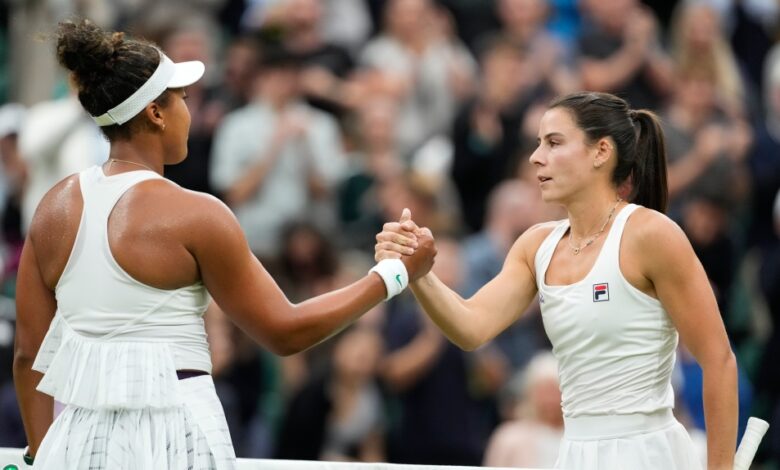How Emma Navarro mentally prepares for a match

LONDON (AP) –
To be sure, Emma Navarro used clean tennis to defeat Naomi Osaka at Wimbledon on Wednesday: just five unforced errors compared to 16 winners; zero break points faced; a four-for-four success rate at the net.
What else helped Navarro reach the third round at the All England Club for the first time by eliminating Osaka — a four-time major champion and former No. 1 — 6-4, 6-1 in under an hour at Centre Court? Little reminders the 23-year-old American types into her cellphone’s notes app before each match.
“That’s an atmosphere that could easily overwhelm me, or overwhelm any player, and I spent just a good amount of time preparing myself mentally for the emotions and the nerves I was going to feel. Then once I got out there, I just felt really at home,” said Navarro, who won the 2021 NCAA singles title for the University of Virginia and is seeded 19th at the grass-court Grand Slam tournament.
“In the notes, I told myself to make the court my home and never be afraid to stay out there for as long as it takes,” Navarro said. “I was able to do that today and it’s pretty cool to come out on the other end of an experience when you’re not sure how its going to go.”
Turned out she didn’t need to worry.
Osaka has never been at her best on grass or clay — all of her Grand Slam trophies came on hard courts at the U.S. Open and Australian Open — and her victory Monday was her first at Wimbledon since 2018. She last played at the tournament in 2019.
“Even though in the beginning, it was kind of like we were trading games, I don’t know why, (but) I didn’t feel fully confident in myself. I didn’t feel like I was playing that well,” said Osaka, who returned to the tour in January after taking 15 months off and becoming a mother. “I guess those doubts started trickling in a lot (and) into my game.”
Navarro, who grew up in South Carolina, has been rising up the rankings quickly recently. She went from No. 143 at the end of 2022, to No. 38 at the end of last year to No. 17 this week.
She did not make it past the second round in each of her first four Slam appearances, but started this season by reaching the third round at the Australian Open, then the fourth round at the French Open and now can get that far at Wimbledon with a win Friday against Diana Shnaider, a 20-year-old from Russia who played college tennis at North Carolina State.
There are going to be more key thoughts to herself typed in by Navarro before that match.
“I’ll write just some bullet points. There are some things that stay constant, that I always write. And then there are other things that are specific to a certain day or a certain match,” she said. “It’s always mental cues, not so much tactical.”
The habit began as a teenager in 2019 after a straight-set loss during a junior event in Milan, Italy, less than two weeks before the start of the French Open juniors.
Navarro said she was so disappointed — “I had played so tight and so scared to lose” — that she sat cross-legged on a patch of grass with her coach for 1 1/2 hours, stewing over the result and picking blades out of the ground until all that was left was dirt.
“I said to myself, ‘I never want to feel like this again. Unprepared mentally.’ Going into the French Open that year, I was really nervous,” she recalled, “and I just felt like I needed to get my thoughts down.”
Worked out pretty well in Paris: Navarro made it all the way to the junior final, defeating Zheng Qinwen (this year’s Australian Open runner-up) along the way before losing to Leylah Fernandez (the 2021 U.S. Open runner-up).
Now Navarro is making her way through the brackets at major tournaments and playing on her sport’s biggest stages.
“A lot of years in the making,” she said.




